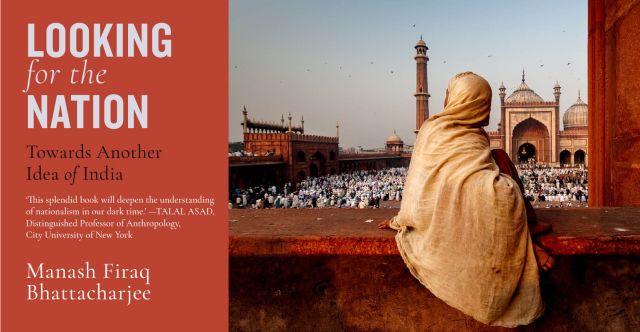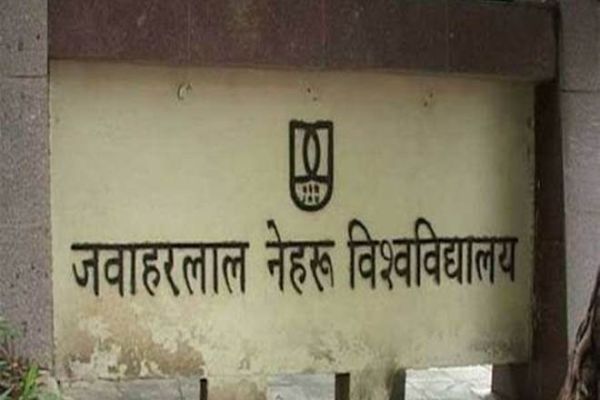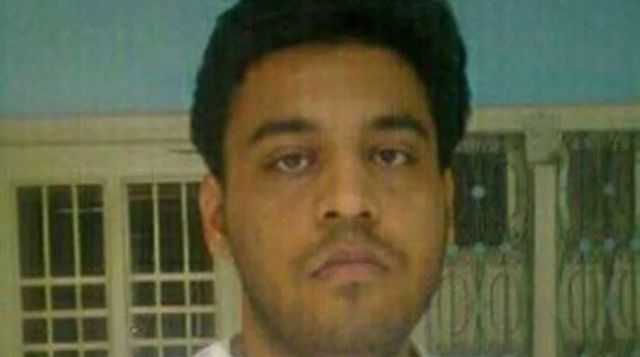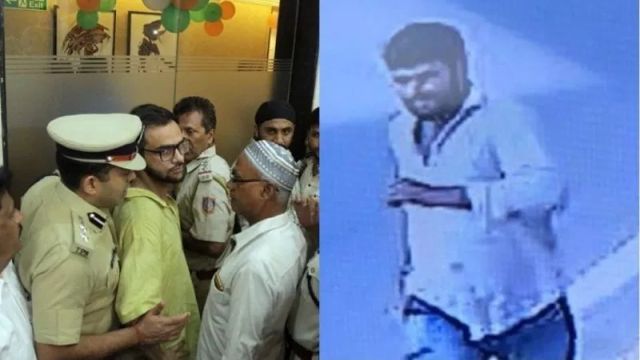
by admin | May 25, 2021 | News
 New Delhi : The CBI has submitted its closure report in the case over disappearance of Jawaharlal Nehru University (JNU) student Najeeb Ahmed, who went missing from here in October 2016, the agency said on Monday.
New Delhi : The CBI has submitted its closure report in the case over disappearance of Jawaharlal Nehru University (JNU) student Najeeb Ahmed, who went missing from here in October 2016, the agency said on Monday.
Sources said the Central Bureau of Investigation (CBI) filed the closure report in the case last week, and the court will consider the matter on November 29.
The agency’s move comes after the Delhi High Court on October 8 allowed the CBI plea seeking permission to file its closure report into the case while rejecting Ahmed’s mother Fatima Nafees’ plea for probe by a Special Investigation Team (SIT).
The court had, however, advised Nafees to raise all contentions available to her in accordance with law before the criminal court concerned after the filing of the closure report by the agency.
Initially, the Delhi Police had been looking into the case, which was later transferred from the CBI.
Nafees had sought an SIT — comprising non-CBI official — to further probe her son’s disappearance from a JNU hostel in the intervening night of October 14-15, 2016.
But the court declined the plea to constitute an SIT and monitor its work.
Ahmed, 27, an M.Sc first-year student, was reported missing after an alleged scuffle with the Akhil Bharatiya Vidyarthi Parishad (ABVP) members, the student body affiliated to the Rashtriya Swayamsevak Sangh. The ABVP has, however, denied its involvement.
—IANS

by admin | May 25, 2021 | Books
 By Saket Suman,
By Saket Suman,
Book: Looking for the Nation; Author: Manash Firaq Bhattacharjee; Publisher: Speaking Tiger; Pages: 202; Price: Rs 350
Manash Firaq Bhattacharjee, who earned his doctorate in Political Science from Jawaharlal Nehru University and has been published widely in national and international media, was haunted by a ghost during his childhood. Several decades on, the political theorist has come out with a scholarly offering — backed by research and reading — as his act of resistance against the ghost.
The author grew up in a small town in Assam and one of his father’s friend, a retired railway employee, was a frequent visitor to their house. For reasons yet incomprehensible to the then young lad, this old man, and his politically sanctioned method, would cast a harrowing shadow on his upbringing.
To put things in perspective, the old man would customarily narrate stories about the violence of Partition, that erupted after India and Pakistan were separated at birth. But his stories “inevitably revolved around Muslims attacking hindu villages,” and the resistance strategies that Hindus evolved to ward off the attack.
“I remember one particular incident he narrated, where scores of bricks were stored on the terraces of Hindu households… When the Muslims attacked, the bricks were put to effective use. “We never wondered why he chose to tell a 14-year-old boy and his sister stories that would shake them to the bone,” he recalls in “Looking for the Nation: Towards Another Idea of India”.
Many years later, Bhattacharjee realised that the telling of such harrowing, sometimes skewed, stories were a part of “a deliberate plan”.
“The man, I learnt much later, belonged to a Hindu right-wing organisation. The stories he told us were part of his job. His job was propaganda. This was a politically sanctioned method to arouse and cement communal sentiments,” he reflects in the book.
But “his lies and fantasies” have caught on with the author’s present and he penned this book, “not looking for a desirable idea of the nation”, but in the quest for “the nation with irony, discovering everything that falls short of fraternity and justice”.
And how does he do it? Fortunately, Bhattacharjee’s offering breaks from the routine books that either blindly critique the functioning of Hindu right wing organisations, or are full of praise for them. His book is neither criticism, nor reflection, if anything, it is an earnest attempt at understanding how our country functions, not in accordance with what is laid down in the Constitution, but in practise in our day-to-day lives.
His arguments are broken down in six chapters, each tracing a particular trajectory that has gone in, or continues to shape, the elusive idea of India.
In the first chapter “The Surplus of Indian Nationalism”, his findings suggest that Indian nationalist thought is a product of the anti-colonial movement. In finding the root and evolution of Indian nationalism, he keenly studies the works of Nehru, Tagore, Gandhi, Ambedkar and others, who, through their participation in the freedom movement, gave voice to the sentiments of nationalism.
He explains that Nehru, in his writings, laid down the larger debate of nationalism, and its relation with modernity, culture, identity and history. Aurobindo, on the other hand, reflected on the nation as “a grand idea in the shadow of religious differences”. The chapter also suggests that Tagore engaged with Gandhi on the question of culture and universalism, while Ambedkar provided a critical perspective on the speculations by nationalist thinkers.
After having laid down the foundation of his research in the first chapter, Bhattacharjee strolls down the “territory without justice”. “…Since then (Independence), the stories of betrayal, hatred, and above all, the fetish for territory, haven’t come to an end”, he notes, before analysing the fate and predicament of the nation’s most “beleaguered people” — the refugees, the Dalits and the minorities.
In the next chapter, he looks at India’s Muslims, with the shadow of Partition behind them, and the future ahead. “The discourse of trust and mutual generosity were taken over by suspicion and hatred. Religion and history were treated as contested territories of difference,” he writes in charting what has “led to the sacrifice of ethical responsibility”.
The remaining chapters focus on “Untouchables”; the institutions of the country, where he finds that bodies are coerced through mechanisms of control; and “Thinking Against Power”, the last chapter of the book, throws light on the resistances against nationalism, caste and other embedded patriarchies.
“Looking for the Nation”, however, may come across as too heavy for some readers, flooded as it is with analogies, reflections and studies of various thinkers and leaders. This book’s merit lies in its structure, and the author succeeds in telling what he set out to do, by dividing the book into six chapters, each focussing on one theme and leading, quite naturally, on to the next.
(Saket Suman can be contacted at saket.s@ians.in)
—IANS

by admin | May 25, 2021 | News, Politics
 New Delhi : About 70 per cent of the Jawaharlal Nehru University (JNU) students cast their ballots on Friday to elect their candidates for top posts in one of the most charged campus elections in the country.
New Delhi : About 70 per cent of the Jawaharlal Nehru University (JNU) students cast their ballots on Friday to elect their candidates for top posts in one of the most charged campus elections in the country.
A total of 5,185 votes were polled out of 7,650, according to the information received by the Election Committee, which comprises university students.
Unofficial sources said this was first time that so many students have turned up to vote in the union election.
The election is primarily for the posts of President, Vice President, General Secretary and Joint Secretary. Currently, all the four posts are held by Left’s Geeta Kumari, Simone Zoya Khan, Duggirala Srikrishna and Shubanshu Singh, in that order.
This year, there are eight candidates in the fray for the post of President. AISA, AISF, SFI and DSF, all leftist groups active in campus politics, have come together — like last year except AISF, which had its own president candidate — to form an alliance and have fielded International Studies scholar N. Sai Balaji as their presidential candidate.
The Rashtriya Swayamsevak Sangh-affiliated student wing Akhil Bharatiya Vidyarthi Parishad (ABVP) has fielded Lalit Pandey for the same post.
The Congress-backed National students’ Union of India (NSUI) has chosen Vikas Yadav as its presidential candidate, who is a student of Inner Asian Studies. Yadav escaped dismissal of his candidature last Friday when the Grievance Redressal Committee of the university recommended nixing of his nomination for being a subject of a disciplinary action by the university authorities for protesting and blocking the roads of campus.
The recommendation was, however, rejected by the Election Committee.
Another presidential candidate is Jayant Kumar from the student wing of Lalu Prasad Yadav’s Rashtriya Janata Dal. Though considered a lightweight originally, Kumar raked in a lot of applause from all stripes of students in the Wednesday’s presidential debate, in which he castigated Left and Right both for their “hypocrisy” in an impeccable speech.
The results of the election are likely to be announced on Saturday.
—IANS

by admin | May 25, 2021 | News, Politics
 New Delhi : The CBI on Tuesday told the Delhi High Court that it has completed its investigation into the disappearance of Jawaharlal Nehru University student, Najeeb Ahmed, from “every aspect” and sought permission to file a closure report in the case.
New Delhi : The CBI on Tuesday told the Delhi High Court that it has completed its investigation into the disappearance of Jawaharlal Nehru University student, Najeeb Ahmed, from “every aspect” and sought permission to file a closure report in the case.
The CBI counsel told a bench of Justice S. Muralidhar and Justice Vinod Goel that the agency has analysed “everything” related to the matter, and that it now wants to file a final report seeking to close the case.
Advocate Colin Gonsalves appearing for Ahmed’s mother Fatima Nafees requested the court to direct CBI to re-investigate the matter or order a further probe by another special investigation team which must comprise officials not belonging to the probe agency.
Gonsalves requested the court to supply him the status reports filed by the agency.
He alleged the probe agency has not conducted the investigation in a fair manner and has shielded members of Akhil Bharatiya Vidyarthi Parishad (ABVP) by not conducting their custodial interrogation.
He alleged political influence in the case as the BJP-led Central Government has “protected” the ABVP members who had threatened Ahmed.
Countering his submission, CBI said that it was just a presumption.
The court observed that it cannot direct CBI to supply status report to the petitioner.
However, the bench said that as per procedure, the petitioner can get detailed reports of the investigation after the final report is filed.
The court also observed that the petitioner can contest the matter once a closure report is submitted.
The bench reserved its order on the habeas corpus plea filed by Fatima Nafees, Ahmed’s mother.
Ahmed, 27, an MSc first year student, was reported missing on October 15, 2016 after a fight allegedly with the ABVP members. The Rashtriya Swayamsevak Sangh-affiliated student body has denied any involvement.
—IANS

by admin | May 25, 2021 | News
 New Delhi : The Delhi Police has detained two youth from Haryana for their murderous attack on Jawaharlal Nehru University student leader Umar Khalid, days after their self-confession video went viral, an officer said on Monday.
New Delhi : The Delhi Police has detained two youth from Haryana for their murderous attack on Jawaharlal Nehru University student leader Umar Khalid, days after their self-confession video went viral, an officer said on Monday.
“Special Cell teams detained Darvesh Shahpur and Naveen Dalal from Haryana on Sunday following a tip-off of their location,” the senior police officer told IANS.
In the video that went viral on August 16, Shahpur and Dalal said that they will surrender to police at a gurdwara near the house of freedom fighter Kartar Singh Sarabha the next day.
“We are responsible for the attack on Khalid (outside Constitution Club) that was meant to be a gift to our country men before the Independence Day. We appeal to police to not punish any innocent youngster for our crime,” they claimed in the video.
Khalid was attacked by an unknown assailant carrying a revolver on August 13 at a tea stall outside the Constitution Club. Accused of raising anti-national slogans in 2016. The student leader survived the attack.
“We are presently interrogating them to establish the reality behind their claims or whether they created the video clip to only create sensation on social media. We are investigating,” the officer added.
—IANS

 New Delhi : The CBI has submitted its closure report in the case over disappearance of Jawaharlal Nehru University (JNU) student Najeeb Ahmed, who went missing from here in October 2016, the agency said on Monday.
New Delhi : The CBI has submitted its closure report in the case over disappearance of Jawaharlal Nehru University (JNU) student Najeeb Ahmed, who went missing from here in October 2016, the agency said on Monday.



